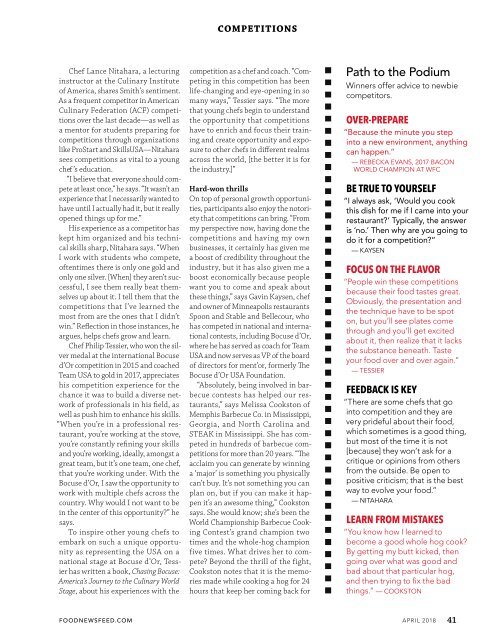FSR magazine April 2018
You also want an ePaper? Increase the reach of your titles
YUMPU automatically turns print PDFs into web optimized ePapers that Google loves.
COMPETITIONS<br />
Chef Lance Nitahara, a lecturing<br />
instructor at the Culinary Institute<br />
of America, shares Smith’s sentiment.<br />
As a frequent competitor in American<br />
Culinary Federation (ACF) competitions<br />
over the last decade—as well as<br />
a mentor for students preparing for<br />
competitions through organizations<br />
like ProStart and SkillsUSA—Nitahara<br />
sees competitions as vital to a young<br />
chef ’s education.<br />
“I believe that everyone should compete<br />
at least once,” he says. “It wasn’t an<br />
experience that I necessarily wanted to<br />
have until I actually had it, but it really<br />
opened things up for me.”<br />
His experience as a competitor has<br />
kept him organized and his technical<br />
skills sharp, Nitahara says. “When<br />
I work with students who compete,<br />
oftentimes there is only one gold and<br />
only one silver. [When] they aren’t successful,<br />
I see them really beat themselves<br />
up about it. I tell them that the<br />
competitions that I’ve learned the<br />
most from are the ones that I didn’t<br />
win.” Reflection in those instances, he<br />
argues, helps chefs grow and learn.<br />
Chef Philip Tessier, who won the silver<br />
medal at the international Bocuse<br />
d’Or competition in 2015 and coached<br />
Team USA to gold in 2017, appreciates<br />
his competition experience for the<br />
chance it was to build a diverse network<br />
of professionals in his field, as<br />
well as push him to enhance his skills.<br />
“When you’re in a professional restaurant,<br />
you’re working at the stove,<br />
you’re constantly refining your skills<br />
and you’re working, ideally, amongst a<br />
great team, but it’s one team, one chef,<br />
that you’re working under. With the<br />
Bocuse d’Or, I saw the opportunity to<br />
work with multiple chefs across the<br />
country. Why would I not want to be<br />
in the center of this opportunity?” he<br />
says.<br />
To inspire other young chefs to<br />
embark on such a unique opportunity<br />
as representing the USA on a<br />
national stage at Bocuse d’Or, Tessier<br />
has written a book, Chasing Bocuse:<br />
America’s Journey to the Culinary World<br />
Stage, about his experiences with the<br />
competition as a chef and coach. “Competing<br />
in this competition has been<br />
life-changing and eye-opening in so<br />
many ways,” Tessier says. “The more<br />
that young chefs begin to understand<br />
the opportunity that competitions<br />
have to enrich and focus their training<br />
and create opportunity and exposure<br />
to other chefs in different realms<br />
across the world, [the better it is for<br />
the industry.]”<br />
Hard-won thrills<br />
On top of personal growth opportunities,<br />
participants also enjoy the notoriety<br />
that competitions can bring. “From<br />
my perspective now, having done the<br />
competitions and having my own<br />
businesses, it certainly has given me<br />
a boost of credibility throughout the<br />
industry, but it has also given me a<br />
boost economically because people<br />
want you to come and speak about<br />
these things,” says Gavin Kaysen, chef<br />
and owner of Minneapolis restaurants<br />
Spoon and Stable and Bellecour, who<br />
has competed in national and international<br />
contests, including Bocuse d’Or,<br />
where he has served as coach for Team<br />
USA and now serves as VP of the board<br />
of directors for ment’or, formerly The<br />
Bocuse d’Or USA Foundation.<br />
“Absolutely, being involved in barbecue<br />
contests has helped our restaurants,”<br />
says Melissa Cookston of<br />
Memphis Barbecue Co. in Mississippi,<br />
Georgia, and North Carolina and<br />
STEAK in Mississippi. She has competed<br />
in hundreds of barbecue competitions<br />
for more than 20 years. “The<br />
acclaim you can generate by winning<br />
a ‘major’ is something you physically<br />
can’t buy. It’s not something you can<br />
plan on, but if you can make it happen<br />
it’s an awesome thing,” Cookston<br />
says. She would know; she’s been the<br />
World Championship Barbecue Cooking<br />
Contest’s grand champion two<br />
times and the whole-hog champion<br />
five times. What drives her to compete?<br />
Beyond the thrill of the fight,<br />
Cookston notes that it is the memories<br />
made while cooking a hog for 24<br />
hours that keep her coming back for<br />
Path to the Podium<br />
Winners offer advice to newbie<br />
competitors.<br />
OVER-PREPARE<br />
“Because the minute you step<br />
into a new environment, anything<br />
can happen.”<br />
— REBECKA EVANS, 2017 BACON<br />
WORLD CHAMPION AT WFC<br />
BE TRUE TO YOURSELF<br />
“I always ask, ‘Would you cook<br />
this dish for me if I came into your<br />
restaurant?’ Typically, the answer<br />
is ‘no.’ Then why are you going to<br />
do it for a competition?”<br />
— KAYSEN<br />
FOCUS ON THE FLAVOR<br />
“People win these competitions<br />
because their food tastes great.<br />
Obviously, the presentation and<br />
the technique have to be spot<br />
on, but you’ll see plates come<br />
through and you’ll get excited<br />
about it, then realize that it lacks<br />
the substance beneath. Taste<br />
your food over and over again.”<br />
— TESSIER<br />
FEEDBACK IS KEY<br />
“There are some chefs that go<br />
into competition and they are<br />
very prideful about their food,<br />
which sometimes is a good thing,<br />
but most of the time it is not<br />
[because] they won’t ask for a<br />
critique or opinions from others<br />
from the outside. Be open to<br />
positive criticism; that is the best<br />
way to evolve your food.”<br />
— NITAHARA<br />
LEARN FROM MISTAKES<br />
“You know how I learned to<br />
become a good whole hog cook?<br />
By getting my butt kicked, then<br />
going over what was good and<br />
bad about that particular hog,<br />
and then trying to fix the bad<br />
things.” — COOKSTON<br />
FOODNEWSFEED.COM APRIL <strong>2018</strong> 41



